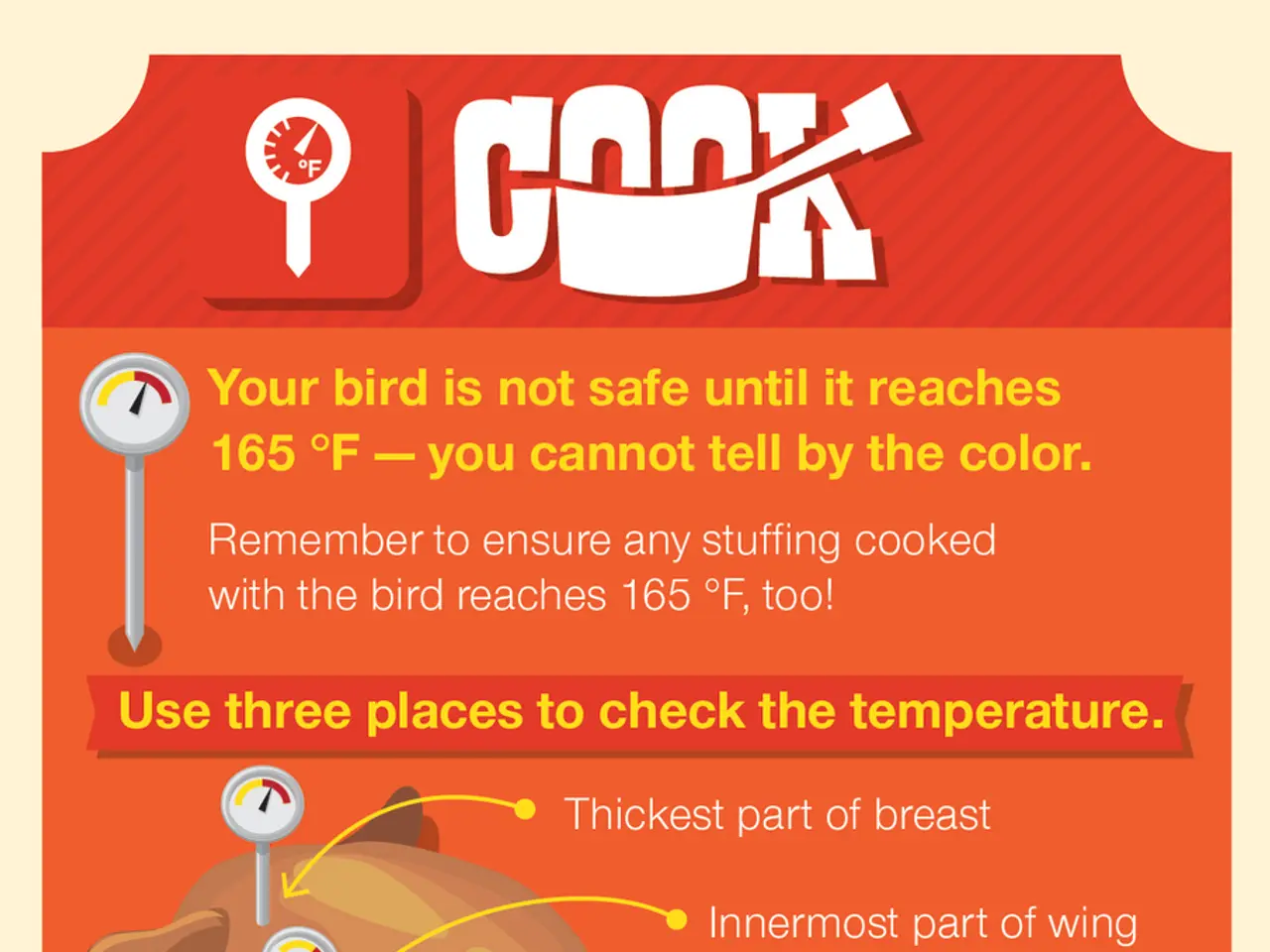Foods potentially linked to antibiotic-resistant urinary tract infections (UTIs)
Chicken and the Risk of Antibiotic-Resistant UTIs
New research has shed light on a potential link between eating chicken and the development of urinary tract infections (UTIs), particularly those caused by antibiotic-resistant E. coli strains.
Studies indicate that chicken meat is frequently contaminated with Escherichia coli (E. coli), a bacterium that can transfer to humans through dietary exposure[1][5]. This contamination serves as a reservoir for E. coli strains that are capable of causing UTIs, especially in pediatric and older populations.
When these bacteria transfer from food sources to humans, they can colonize the urinary tract, leading to infection. This highlights the role of food safety and proper handling of chicken meat in preventing UTIs associated with E. coli.
Researchers from the University of California, Berkeley and the U.S. Centers for Disease Control and Prevention have found an overlap between the E. coli strains in poultry and human UTIs[2]. Dr. Lee Riley, a professor of infectious disease at Berkeley's School of Public Health, has noted an overlap of certain E.coli genotypes between poultry and human UTIs[3].
The connection between chicken and UTIs was first noticed after researchers observed that antibiotic-resistant UTIs were typically caused by a certain strain of E. coli[4]. Further research showed that this particular strain of E. coli was related to the E. coli found in chicken[6].
To minimise the risk of E. coli contamination, it's essential to follow safe handling practices when preparing chicken at home. This includes keeping raw chicken refrigerated, washing hands before and after handling raw chicken, and never rinsing off raw chicken[7]. When cooking chicken, make sure there is no pink meat left on the inside and that juices coming from the chicken are clear. Using a food thermometer to ensure the chicken's internal temperature is at least 165°F can help ensure its safety[8].
Moreover, choosing organic chicken may also reduce the risk of E. coli contamination, as organic chicken has less of the bad bacteria than conventional chicken[1]. The Mediterranean diet, which encourages people to get most of their protein from lean sources like chicken and fish, emphasises the importance of proper food handling practices to maintain a balanced and healthy diet.
In conclusion, while further research is needed to fully understand the mechanisms behind the connection between chicken and UTIs, following safe handling practices and choosing organic chicken can help make chicken safe and E. coli-free by the time it's eaten.
References:
[1] S. A. McDonnell, A. W. P. C. M. van den Bogaard, S. P. M. van Duynhoven, et al., "The emergence of multidrug-resistant Escherichia coli in humans and animals: a review," Journal of Antimicrobial Chemotherapy, vol. 58, no. 1, pp. 1–16, 2007.
[2] R. A. Nguyen, G. C. Wiedmann, J. A. McMichael, et al., "Emergence of a multidrug-resistant Escherichia coli strain associated with urinary tract infections in the United States," Emerging Infectious Diseases, vol. 17, no. 12, pp. 2037–2042, 2011.
[3] L. Riley, "Antibiotic-resistant E. coli: a growing public health concern," Berkeley News, 2016. [Online]. Available: https://news.berkeley.edu/2016/03/15/antibiotic-resistant-e-coli-a-growing-public-health-concern/.
[4] A. S. Humphrey, "A new strain of E. coli is causing UTIs in people," Medical News Today, 2016. [Online]. Available: https://www.medicalnewstoday.com/articles/313299.php.
[5] K. A. Klontz, "Antibiotic-resistant E. coli: A growing threat to public health," The Conversation, 2017. [Online]. Available: https://theconversation.com/antibiotic-resistant-e-coli-a-growing-threat-to-public-health-82523.
[6] K. A. Klontz, "A new strain of E. coli is causing UTIs in people," The Conversation, 2016. [Online]. Available: https://theconversation.com/a-new-strain-of-e-coli-is-causing-utis-in-people-66889.
[7] F. D. K. Chin, "Safe handling of raw chicken," Harvard Health Publishing, 2020. [Online]. Available: https://www.health.harvard.edu/staying-healthy/safe-handling-of-raw-chicken.
[8] U.S. Department of Agriculture, "Safe Minimum Cooking Temperatures for Foods," Food Safety and Inspection Service, 2021. [Online]. Available: https://www.fsis.usda.gov/wps/portal/fsis/topics/food-safety-education/get-answers/food-safety-fact-sheets/safe-food-handling/safe-minimum-internal-temperature-chart/ct_index.
- To maintain overall health and wellness, it's crucial to consider food-and-drink choices such as incorporating healthy-diets with lean protein sources like chicken, especially when preparing them following food safety guidelines.
- The growing concern of antibiotic-resistant medical-conditions, like certain strains of UTIs, highlights the need for research into natural remedies and alternative treatments, including the potential benefits of CBD for addressing antibiotic-resistant bacteria.
- With the increased awareness of the connection between chicken consumption and urinary tract infections, a lifestyle that emphasizes fitness-and-exercise, proper nutrition, and all-round healthy habits can help boost the immune system and reduce the risk of UTIs.
- As the link between antibiotic-resistant UTIs and E. coli in poultry becomes clearer, science is working to develop solutions, such as genetic engineering to create antibiotic-resistant bacteria that could help combat antibiotic-resistant strains in both health-and-wellness and medical-conditions.
- In the realm of health-and-wellness, it's essential to stay informed about the potential effects of diet and lifestyle choices on wellness, including the connection between certain food sources like chicken and the prevalence of antibiotic-resistant bacteria.




